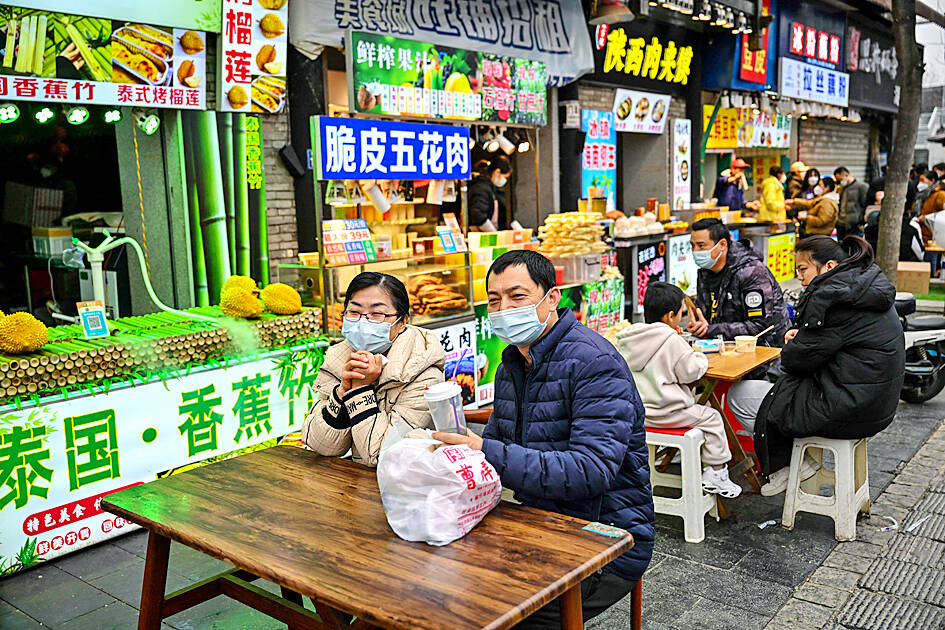Residents of China’s Wuhan yesterday said they were hopeful for the future and no longer afraid of COVID-19, three years after the city was locked down over what was then a mysterious virus.
Since Beijing ordered Wuhan sealed off in a bid to suffocate the outbreak in January 2020, COVID-19 has devastated the planet, killing millions and plunging the global economy into turmoil.
However, life is now back to normal for many across the globe and after almost three years of grueling lockdowns and mandatory mass testing, Beijing last month lifted its hardline “zero COVID-19” policy.

Photo: AFP
As China celebrated Lunar New Year this week, Wuhan was unrecognizable compared with the apocalyptic scenes that gripped the city of 11 million in early 2020.
Locals braved icy temperatures to pack busy markets and families — some not wearing masks — bought toys and threw stones along the Yangtze River.
Many told reporters that they were elated that life was returning to normal.
“The new year will of course be better,” Yan Dongju, a cleaner in her 60s, told reporters. “We are not afraid of the virus anymore.”
“Now that we have opened up, everyone is quite happy,” delivery driver Liang Feicheng said, wearing glasses and a black mask to keep warm.
“A lot of our worries and depression have all slowly been resolved,” he added. “People are going about their lives, coming together with family and friends, going out to play and travel and being happy.”
The January 2020 decision to lock down the city, announced in the middle of the night, took Wuhan’s residents by surprise as the world watched on with uncertainty.
For 76 days, Wuhan was cut off from the world, with residents holed up in their homes for fear of being infected as hospitals overflowed with patients.
However, the horrifying scenes which marked the world’s first COVID-19 lockdown are now a thing of the past.
Outside a shop where Agence France-Presse captured the scene of a man who lay dying in the street in January 2020 — in an image that would become a symbol of the world’s fight against COVID-19 — a sign for a new school on the second floor reads “House of Hope.”
However, in a cogent reminder of the fraught geopolitics that would emerge as the virus spread across the globe, Wuhan’s Huanan Seafood Wholesale Market — once suspected of being the epicenter of the outbreak — remains closed.
The area around the once-bustling wet market was desolate when reporters visited yesterday, although a police vehicle kept watch.
China, relatively unscathed for years after its initial outbreaks thanks to draconian “zero COVID-19” measures, has faced its biggest-ever case surge in recent weeks.
About 80 percent of the population is believed to have contracted COVID-19 since health restrictions were lifted last month, Chinese Center for Disease Control and Prevention chief epidemiologist Wu Zunyou (吳尊友) said.

Incumbent Ecuadoran President Daniel Noboa on Sunday claimed a runaway victory in the nation’s presidential election, after voters endorsed the young leader’s “iron fist” approach to rampant cartel violence. With more than 90 percent of the votes counted, the National Election Council said Noboa had an unassailable 12-point lead over his leftist rival Luisa Gonzalez. Official results showed Noboa with 56 percent of the vote, against Gonzalez’s 44 percent — a far bigger winning margin than expected after a virtual tie in the first round. Speaking to jubilant supporters in his hometown of Olon, the 37-year-old president claimed a “historic victory.” “A huge hug

Two Belgian teenagers on Tuesday were charged with wildlife piracy after they were found with thousands of ants packed in test tubes in what Kenyan authorities said was part of a trend in trafficking smaller and lesser-known species. Lornoy David and Seppe Lodewijckx, two 19-year-olds who were arrested on April 5 with 5,000 ants at a guest house, appeared distraught during their appearance before a magistrate in Nairobi and were comforted in the courtroom by relatives. They told the magistrate that they were collecting the ants for fun and did not know that it was illegal. In a separate criminal case, Kenyan Dennis

A judge in Bangladesh issued an arrest warrant for the British member of parliament and former British economic secretary to the treasury Tulip Siddiq, who is a niece of former Bangladeshi prime minister Sheikh Hasina, who was ousted in August last year in a mass uprising that ended her 15-year rule. The Bangladeshi Anti-Corruption Commission has been investigating allegations against Siddiq that she and her family members, including Hasina, illegally received land in a state-owned township project near Dhaka, the capital. Senior Special Judge of Dhaka Metropolitan Zakir Hossain passed the order on Sunday, after considering charges in three separate cases filed

APPORTIONING BLAME: The US president said that there were ‘millions of people dead because of three people’ — Vladimir Putin, Joe Biden and Volodymyr Zelenskiy US President Donald Trump on Monday resumed his attempts to blame Ukrainian President Volodymyr Zelenskiy for Russia’s invasion, falsely accusing him of responsibility for “millions” of deaths. Trump — who had a blazing public row in the Oval Office with Zelenskiy six weeks ago — said the Ukranian shared the blame with Russian President Vladimir Putin, who ordered the February 2022 invasion, and then-US president Joe Biden. Trump told reporters that there were “millions of people dead because of three people.” “Let’s say Putin No. 1, but let’s say Biden, who had no idea what the hell he was doing, No. 2, and